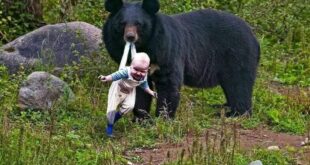A working mother recently experienced a deeply unsettling and distressing incident involving her baby daughter’s babysitter. Her harrowing ordeal began when she wrote to Slate’s advice column, Dear Prudence, seeking guidance on an alarming discovery she made at a daycare facility in the United States. She had entrusted her beloved adopted baby daughter to the care of a woman who seemed perfect for the job, especially since the caregiver had children of her own, one of whom was just slightly older than the mother’s baby.
However, there was a minor hiccup that raised some concerns early on. The babysitter had expressed a strong disapproval for formula, bluntly referring to it as “slop.” Despite this comment, the mother decided to give the arrangement a chance, believing that such remarks could be overlooked.
Nonetheless, the situation took a shocking and horrifying turn approximately two months later when the mother decided to pick up her child early from daycare. She used a side entrance for parents, allowing her to enter without knocking. However, what she encountered when she reached the area where her daughter was being cared for left her stunned and deeply troubled. She found the caregiver breastfeeding her baby, an act that was far beyond her expectations.
Overwhelmed by this startling discovery, the mother immediately confronted the caregiver, taking her baby from her arms, and expressing her shock and disbelief. The mother now faces the challenging task of figuring out the best course of action in response to this disturbing incident, with returning her daughter to the same daycare facility being entirely out of the question.

The text also highlights the potential dangers and risks associated with sharing breast milk. These dangers range from concerns about infections, hygiene, and possible allergies to more complex issues such as the evolving nature of breast milk as the baby grows, the emotional bond established through breastfeeding, and the unpredictability of milk sources when it is shared. It also delves into the risks associated with improperly sanitized pumping equipment, decreased milk supply for mothers, and the uncertainty of the quality and safety of donated milk, among other factors.

In light of this situation, the mother is grappling with an important decision. She questions whether to report the caregiver to the overseeing organization responsible for home daycare providers or to raise awareness about this incident on social media. A relative has suggested contacting the parents of other children who attend the same daycare facility to conduct their own investigations, though the mother is hesitant about taking this approach.
Why it’s dangerous to share breast milk
The response from the Dear Prudence advice column is one of shared shock and an unequivocal recommendation to report the daycare provider without delay. The incident, in their view, constitutes a grave breach of trust and a blatant violation that must be reported to the appropriate authorities. The text serves as a compelling narrative about a mother’s distressing experience and the moral dilemmas it presents.
 Only in Canada Only in Canada
Only in Canada Only in Canada




